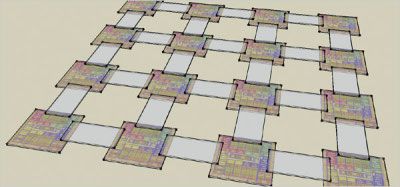From our front-page news:
Computer chips can offer fast performance, we know this. But, the Pentagon believes that there should be a faster method to transmit information between chips than the typical wire. So, they've given Sun Microsystems a $44 million contract to explore the prospect of replacing these wires with laser beams.
In theory, replacing the wires with a laser beam would offer major benefits in every regard. For one, it would rid the problem of current leakage and could improve temperatures (probably), while also improving the performance dramatically. Though it seems like a far-out estimate, the article at the New York Times states that a beam of laser light could carry tens of billions of bits of data a second. Wow.
But, this project is not one that can give us great confidence in seeing a final product. One of the researchers at Sun Laboratories is quoted as saying the project has a 50% chance of failure. For a lottery, those odds would be great, but where a $44 million project is involved, they don't seem overly promising. The goal is immense, but if laser beams replacing wires become a reality, the future of computer chips could be very interesting.
<table align="center"><tbody><tr><td>

</td></tr></tbody></table>
The wires that connect chips are analogous to the on and off ramps that cars use to move between freeways — just as cars slow down as they move onto city streets from multilane highways, electrical signals run more slowly between chips. The bottlenecks also generate additional electrical current and heat.
Source: New York Times
In theory, replacing the wires with a laser beam would offer major benefits in every regard. For one, it would rid the problem of current leakage and could improve temperatures (probably), while also improving the performance dramatically. Though it seems like a far-out estimate, the article at the New York Times states that a beam of laser light could carry tens of billions of bits of data a second. Wow.
But, this project is not one that can give us great confidence in seeing a final product. One of the researchers at Sun Laboratories is quoted as saying the project has a 50% chance of failure. For a lottery, those odds would be great, but where a $44 million project is involved, they don't seem overly promising. The goal is immense, but if laser beams replacing wires become a reality, the future of computer chips could be very interesting.
<table align="center"><tbody><tr><td>

</td></tr></tbody></table>
The wires that connect chips are analogous to the on and off ramps that cars use to move between freeways — just as cars slow down as they move onto city streets from multilane highways, electrical signals run more slowly between chips. The bottlenecks also generate additional electrical current and heat.
Source: New York Times
